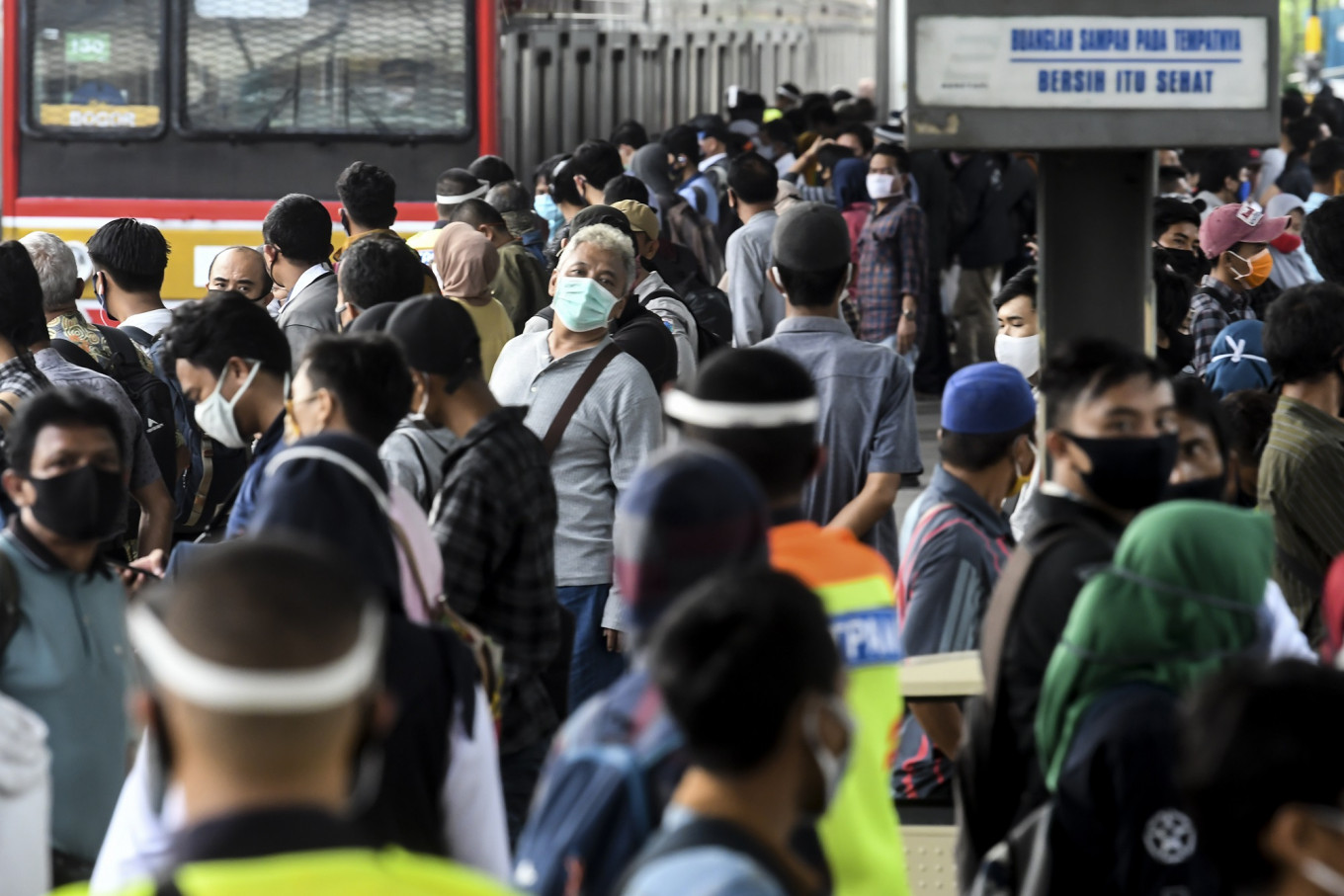Popular Reads
Top Results
Can't find what you're looking for?
View all search resultsPopular Reads
Top Results
Can't find what you're looking for?
View all search resultsIndonesia records new daily highs in cases during transition to 'new normal'
Change text size
Gift Premium Articles
to Anyone
A
s Indonesia transitions into the “new normal”, the country continues to report high numbers of new COVID-19 cases, with three new daily records reported since the beginning of June as well as the highest daily death toll of 64 fatalities on Monday.
The government reported a record daily high of 993 new cases on June 6, exceeding the previous high of 973 cases on May 21, followed by 1,043 cases on June 9 and 1,240 cases the following day, with epicenters East Java and Jakarta contributing significantly to the tallies.
Government spokesperson for COVID-19 affairs Achmad Yurianto attributed the spikes to "aggressive contact tracing".
COVID-19 task force expert staff chief Wiku Adisasmito said the spikes “should not be seen negatively", as it was a sign of the country's increased polymerase chain reaction (PCR) and rapid molecular testing and improved tracing capacities, arguing that it did not necessarily indicate that the rate of infection had increased.
"This [spike in the number of daily reported cases] is also a result of an accumulation of previously unreported cases. [The data on new cases] must be by averaged out weekly; this is more informative than viewing it on a daily basis," he told The Jakarta Post on Monday.
In the past week, Indonesia has recorded an average of 1,103 new cases from an average of 7,684 people tested daily, representing a 14 percent positivity rate on average. Indonesia has tested 1.2 per 1,000 people, one of the lowest rates in the world, according to ourworldindata.org.
On Tuesday, the government reported 1,106 new cases, with the overall total reaching 40,400 with 2,231 deaths.
Read also: COVID-19: Jokowi warns of second wave, but first one may not be over
While acknowledging that testing capacity had been improved thanks to an increased number of labs processing COVID-19 tests, epidemiologist Pandu Riono argued that the testing rate was still far from ideal, as more tests should have led to a lower positivity rate.
"If infections have declined and we have tested more people, then the positivity rate should have declined," he said.
Pandu pointed to the possibility of new clusters emerging because of increased travel during the Idul Fitri holiday in late May, as it fit with the timeline.
The government issued a mudik (exodus) ban as part of its COVID-19 containment efforts but experts have criticized the lack of enforcement, especially after authorities announced several exemptions to the travel restrictions in early May. The virus has now reached 431 of the country's 514 cities and regencies, up from 416 cities and regencies on May 31.
The World Health Organization's (WHO) latest COVID-19 situation report on Indonesia published on June 10 said one of the epidemiological criteria for relaxing large-scale social restrictions (PSBB) was for fewer than 5 percent of samples to test positive over a two-week period.
More than one sample can be taken from one person.
None of Java's six provinces the WHO assessed between May 25 and June 7 had met the criteria, the report said. It noted, however, that a reliable positivity rate requires at least 1 test per 1,000 population per week, which only Jakarta has fulfilled.
Jakarta has tested 102,859 people so far, and reported 105 new cases with a positivity rate of 6.2 percent among the total number of people tested, or 6.7 percent of the total samples tested, on Monday when it began reopening malls, shops and offices.
Not all regions provide data on the number of people tested. West Java, home to some 48 million people, had only tested 60,389 people as of June 13. East Java, which has recorded more fatalities than Jakarta, does not provide testing data, but its capital of Surabaya, home to some 2.7 million people, revealed it had conducted 8,214 tests as of June 13.
Read also: Indonesian wet markets carry high risk of virus transmission
Epidemiologist Pandu urged local administrations to be transparent with their testing data, as he feared regional leaders were not willing to conduct increased tests for fear of losing their low-risk or "green zone" status or for political interest given the upcoming regional elections.
Further upgrades to the country's diagnostic capabilities to provide real-time reports of new cases was also necessary, he said.
A time lag between tests and results continues to persist in Indonesia, and can vary greatly with some people having to wait a week or more for test results, Wiku of the COVID-19 task force said.
The country’s inability to report real-time case numbers is likely to persist, given its size and the fact some regions need to ship samples to labs in other cities, he said.
In addition, not all labs in the country can operate 24 hours a day, as a shortage of trained lab workers and limited automatic extractors prevented the country from scaling up its diagnostic capacity. Yurianto, for instance, attributed the low number samples recorded on Monday to the fact staff at some hospital and university labs did not work on the weekend.
The WHO report advises that test results be made available within 24 to 48 hours, and lists this as one of the "non-negotiable measures for the 'new normal' scenario".
The report, however, acknowledges that provinces with hard-to-reach areas faced difficulties transporting samples and with effective contact tracing.
A senior epidemiologist close to the issue said ideally each community health center (Puskesmas) in the country should have at least three epidemiologists to conduct contact tracing and data analysis, especially when dealing with a highly infectious disease like COVID-19. He said, however, that epidemiologists were not evenly distributed across the country as not all regions "felt the need" to request for additional manpower.










